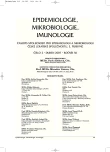-
Medical journals
- Career
Clinical Specimens for PCR Detection of Syphilis
Authors: V. Woznicová; M. Votava; M. Flasarová
Authors‘ workplace: Mikrobiologický ústav LF MU a FN u sv. Anny v Brně, Brno
Published in: Epidemiol. Mikrobiol. Imunol. 56, 2007, č. 2, s. 66-71
Overview
A review is presented of types of clinical specimens used for diagnosis of syphilis by polymerase chain reaction. PCR is a routine method for detection of T. pallidum in swabs of chancres and primary and secondary syphilis mucocutaneous lesions. Whole blood, cerebrospinal fluid, amniotic fluid, aspirate and biopsy specimens, and paraffin-embedded tissues can also be tested by PCR for T. pallidum. However, further research on PCR detection sensitivity at various stages of syphilis is needed before these specimens are used in clinical practice.
Key words:
syphilis – T. pallidum – clinical specimens – PCR.
Labels
Hygiene and epidemiology Medical virology Clinical microbiology
Article was published inEpidemiology, Microbiology, Immunology

2007 Issue 2-
All articles in this issue
- Pertussis: a Reemerging Infection?
- Clinical Specimens for PCR Detection of Syphilis
- Urinary Tract Infections in Children Caused by Uropathogenic Strains of Escherichia coli and the Role Of The Innate Immune Response Mediated by the Toll-like Receptor 4 and Antimicrobial Peptide Cathelicidin in their Clinical Course
- Effectiveness of Aerial Application of VectoBac G Larvicide Granules Against Mosquitoes in the Olomouc Region in Spring 2006
- Monitoring Genes Encoding Panton-Valentine Leukocidin in Staphylococcus Aureus Strains
- Epidemiology, Microbiology, Immunology
- Journal archive
- Current issue
- Online only
- About the journal
Most read in this issue- Monitoring Genes Encoding Panton-Valentine Leukocidin in Staphylococcus Aureus Strains
- Pertussis: a Reemerging Infection?
- Effectiveness of Aerial Application of VectoBac G Larvicide Granules Against Mosquitoes in the Olomouc Region in Spring 2006
- Clinical Specimens for PCR Detection of Syphilis
Login#ADS_BOTTOM_SCRIPTS#Forgotten passwordEnter the email address that you registered with. We will send you instructions on how to set a new password.
- Career

